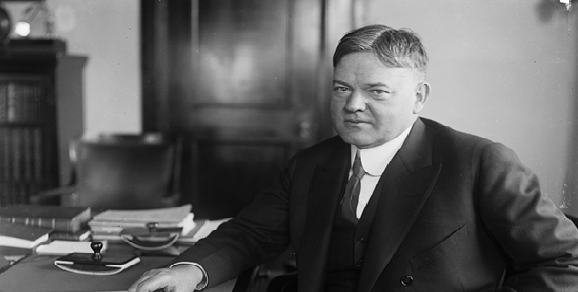
Herbert Hoover – The first German-American President
Written by Ciaran Lyons
Born August 10, 1874, Herbert Clark Hoover was the first American of German descent to occupy the Oval Office.
Hoover was a unique president for his time, not only because of his heritage, but for being a self-made man from the West Coast, as most presidents before him were northerners from well-established families. As president, Hoover was tasked with solving the Great Depression, his failure to do so forever coloring his legacy. But in reality his career as an organizer and an advocate spanned well beyond his four years in the White House.
The Hoovers likely came to America early, before the war for independence, as indicated by their anglicized name. Originally the family would have gone by “Huber”, a name common among German farmers. As minorities, Germans in early America like the Hoovers sought assimilation into Anglo-American society, so they took names that would have sounded more familiar to English-speakers. Only with the later wave of immigration in the 19th century did Germans take bolder steps to preserve their cultural identity, such as leaving their surnames unchanged.
By the time Herbert was born his family had established themselves in West Branch, Iowa, his father a blacksmith. Herbert’s family life was unstable, his father dying when he was six years old and his mother dying when he was nine, forcing him and his sister to move in with their uncle in Oregon. An unmotivated student, Herbert opted to work at his uncle’s real estate office instead of attending high school, though he would later study at Stanford University as part of its first graduating year.
Trained as an engineer, Hoover lent his expertise to mining operations in Nevada, Australia, China, and Burma. It was in this line of work that Hoover gained the experience necessary to become a prodigious organizer. With the outbreak of World War I, Hoover was tasked by the U.S government to evacuate American citizens from Europe, and would later organize efforts to feed civilians in German-occupied Belgium. President Wilson then made Hoover head of the Food Administration, where he successfully balanced American food supplies between domestic consumption and the needs of war-torn Europe. After the war, Hoover was appointed Secretary of Commerce, a position he would hold from 1921 to 1928. During his tenure, the scope of the Commerce Department grew many-fold, Hoover becoming informally known as the “Under-secretary of all other departments”. Hoover’s experience landed him the Republican Party’s nomination for president, with which he won the 1928 election in a landslide. Upon being nominated by the GOP, Hoover declared: “We shall soon with the help of God be in sight of the day when poverty will be banished from this land.”
The Great Depression dashed President Hoover’s hopes for his country, the stock market crashing just six months into his term. At first taking a limited approach to economic stimulus, the increasingly dire situation spurred Hoover to adopt an interventionist policy; in 1932 he oversaw the largest tax hike in U.S history. But he maintained that recovery should be shouldered by local efforts and the voluntary conduct of private enterprise.
It was this belief of his that made Hoover so upset about President Franklin Roosevelt’s New Deal. Hoover deemed Roosevelt’s direction of the recovery a massive overstep by the federal government, and took issue with his deficit spending. As the scope of federal activities under FDR became permanent fixtures in Washington, Hoover became a vocal conservative critic, many of his beliefs forming the backbone of modern American conservatism. However, many historians point out it was Hoover who initially planned the programs that would form the New Deal regime, such as public works programs and Social Security—for this reason some herald Hoover as the father of modern American liberalism.
Hoover was raised Quaker and would practice his faith until passing away in 1964. Regardless of the political positions Hoover took, they were for him towards the end of improving humankind. He sent food to the starving Soviet Union as head of the Food Administration, despite America being in the midst of the Red Scare. He used his authority as Secretary of Commerce to organize relief after the Mississippi River flooded in 1927, no government body at the time being specifically designated for such a task. And after his presidency he worked to raise funds for starving children in Europe, the continent again ravaged by war, and cooperated with President Eisenhower to help found UNICEF.
Want to learn more about Herbert Hoover? You can visit his presidential library’s website, or go in person at 210 Parkside Drive, West Branch, Iowa, 52358.
Sources:
Hoover as Secretary of Commerce—image via Library of Congress, photographed by Harris & Ewing https://www.loc.gov/item/2016885717/
August 11, 1932 speech to Republican National Convention: https://publicpolicy.pepperdine.edu/academics/research/faculty-research/new-deal/hoover-speeches/hh081132.htm
Blurb from White House: https://www.whitehouse.gov/about-the-white-house/presidents/herbert-hoover/
Wikipedia: https://en.wikipedia.org/wiki/Herbert_Hoover
Bio from Hoover Pres. Library: https://hoover.archives.gov/hoovers/president-herbert-hoover
Hoover on the New Deal, Great Depression response: https://www.gilderlehrman.org/content/herbert-hoover-great-depression-and-new-deal-1931%E2%80%931933
C-SPAN documentary on Hoover: https://www.c-span.org/video/?151627-1/life-portrait-herbert-hoover